Search Results for Tag: Renewables
Arctic Oil – a white elephant?
The conference: Arctic Frontiers has attracted a record number of participants this year and huge media interest. For the first time in addition to a political and a science section, there is also a business section. It will focus on oil, gas and minerals. Clearly, once more, the Arctic is a “hot topic”.
The conference opened with an exceptionally good panel discussion tonight. The conference title is “Climate and Energy”, and it is hardly surprising that there is a lively debate on that here. Norway is, after all, an oil nation, but at the same time a country well known for innovation and wise financial management. And then, of course, comes the urgency of the climate conundrum…
Here in Tromso, Norway’s “Arctic capital”, the question of Arctic oil obviously plays a key role. The representative of the region Line Miriam Sandberg, County administrator for business, culture and health, and the panel chair Olav Orheim, (GRID Arendal, a centre that works with UNEP) made it quite clear that a lot of people here are in favour of Arctic development, including oil and gas exploration, in the interests of jobs and economic benefits.
The representative of the oil industry Kjell Giæver, Director of Petroarctic found himself a bit out on a limb, though. Apart from the Tromso representative, there was no real support for or confidence in Arctic oil development amongst the panelists. Guest of honour HSH Prince Albert II of Monaco, who is quite committed to Arctic protection and has a tradition of Arctic exploration in his family, stressed the need to protect against any dangers to the fragile environment.
The Chair of the US Arctic Research Commission Fran Ulmer called for a carbon tax and measures to protect the climate and reduce fossil fuel consumption. Although she stressed this was her personal opinion and she could not speak for ANY government (!), she is obviously in a very influential position, and anything she says on this has to be taken seriously.
It will come as no surprise that Nina Jensen, CEO of WWF Norway, is against oil exploration in the Arctic. I can remember her here at previous conferences having a much more difficult time, with plenty of opposition from other speakers. This time, my impression was that she was definitely not in a minority.
Probably the most noteworthy stance – certainly the one that impressed me most – was taken by Jens Ulltveit-Moe, the CEO of Umoe, one of the largest, privately owned companies in Norway, active amongst other things in shipping and energy. Here we had an industry representative, who said quite clearly that with the current low oil price Arctic oil was simply not viable, and this would remain the case for many years to come. (The oil industry rep as you can imagine disagreed). And by then, he said, the EU’s climate targets and the international support for a two-degree target would make fossil fuels a non-option. The future lies in renewables, he says, and Arctic oil investment will probably be a white elephant. (His group is involved in bioenergy), Now there is food for thought at the start of this high-profile gathering, which will see high-ranking government representatives from the Arctic nations, but also China and others, discuss “climate and energy”. If the opening debate is anything to go by, the next two days will be very lively.
UN Climate Chief on New York summit
Your Ice Blogger has been busy with the New York climate summit around the corner. I was delighted to read that Ban Ki Moon is considering a special Arctic summit and a trip on a Greenpeace Arctic mission vessel after receiving a petition to Save the Arctic. I am also hoping there will be some high-profile promises of climate action.
Meanwhile, here in Bonn, I talked to Christiana Figueres, the Executive Secretary of the UNFCCC (Climate Secretariat), which is based here in Bonn, just next door to my Deutsche Welle Office, before she left for New York.
She told me what she expects of this meeting, which is something different from the regular UN climate summits. She also told me why she was joining yesterday’s climate march.
Let me share some excerpts from the interview in writing here with you, and offer you a full length audio version of my talk to this very influential and passionate lady.
More on the climate summit and the Arctic here soon.
Excerpts from my interview with Christiana Figueres:
Ice Blogger: Why do we need yet another climate summit?
The conferences we organize once a year have the purpose of moving towards a legally based agreement, scheduled to be adopted in Paris next year. In New York, nothing is going to be negotiated. It’s very much an attempt to blow wind into the sails of the formal process. It’s about raising political will and public awareness. It is a powerful opportunity for the leaders of countries and corporations to come forward and say what each of them is going to do.
UN Secretary-General Ban Ki-moon has asked these leaders to bring bold announcements and actions to the summit. What do you expect to come out of it?
We will have a host of announcements from governments about what they are already doing and will undertake with respect to bringing down their own emissions and increasing the resilience that they need to incorporate into their planning and their infrastructure to deal with the variability and the vulnerability of climate change. From the private sector we expect the same: announcements as to how they are going to contribute to reduce emissions, either in their own operations or, even more interestingly, how they are going to be shifting their capital into low-carbon services and products to accelerate the global shift towards a low-carbon economy.
Are you expecting major announcements by the host country USA or a key player such as China?
Yes, we are expecting all countries to come forward and begin to put on the table what they will be able to contribute next year into a much more formal setting. But for that, the deadline is not until March 2015. What we expect is indications of what is possible. The fact is that most countries around the world are currently doing their homework and figuring out at a national scale what is financially, politically, economically and technically possible for them to do.
The summit is taking place in the USA, a key player in terms of emissions and a possible new climate agreement. Can hosting the summit there make a difference to US attitudes and policy?
The second term of President Obama has seen an accelerated and up-scaled engagement on climate change. The latest move of the Obama administration to ask the EPA (US Environmental Protection Agency) to come forward with regulations on power plants is probably the most ambitious action the US government has taken on climate change. We expect President Obama will be giving indications of how the United States is going to further build on those efforts. It is also very interesting that on US land, there will be the people’s climate march, just two days before the summit. That will show that there is, even in the United States, broad and deep public support for global climate policy making.
Do you think this kind of grassroots movement is what we need to take things forward?
I think it’s a very important component. I’m very grateful to the organizers of the march and to everyone who’s going to be at the march. I will be there, because it’s important to give a very strong message that it is not just the responsibility of governments or corporations, but rather there is also civil society responsibility here to make their awareness and concern felt, and encourage countries and companies to move towards low-carbon economies as soon as possible.
Some people say cities and regions should play a bigger role while governments struggle to negotiate a climate agreement?
Well it’s not an either or. Cities all around the world have already taken a very impressive lead. And we will hear from them. The mayors of hundreds of cities will be in New York, and the same goes for regions, whether it’s groups of countries or groups of municipalities. The optimization of climate action is going to come from the coherent integration of policy from the international level to the national to the local level.
Isn’t it difficult to arouse interest in an additional climate summit in the current world political situation with attention focused on conflicts in the Middle East, Ukraine and other places?
The whole week in New York will see much press attention to the summit. Not only because we will have hundreds of thousands of people on the street, not only because we will have hundreds of political leaders there, hundreds of corporations, but because they are all coming to New York for one very powerful reason. That is, climate change is now the biggest challenge that humanity has faced, certainly in this century. And there is growing awareness of this. There is already a lot of conflict around the world, around water scarcity, around migration, around food and security, and that is exacerbated by climate change. So if we want to prevent conflicts that will scale out of control, then we have to address climate change in a timely fashion.
The latest figures show greenhouse gas emissions are still rising. Scientists say the two degree target is virtually out of reach. What has to happen to bring about the kind of action we need to avert disastrous climate change?
Science has made it very clear: there is only one pathway that will allow us to stay under the maximum two degree maximum temperature increase which is the maximum temperature increase we could allow, and still maintain a more or less predictable climate for all populations around the world. So this summit and the formal processes which will occur in Peru at the end of this year and in France at the end of next year are three very important clarion calls to world leaders both public and private that time is running out. We still have the time to do it, but in order to avert the worst effects of climate change, we have to come to a global agreement by next year.
Coal, climate, cryosphere
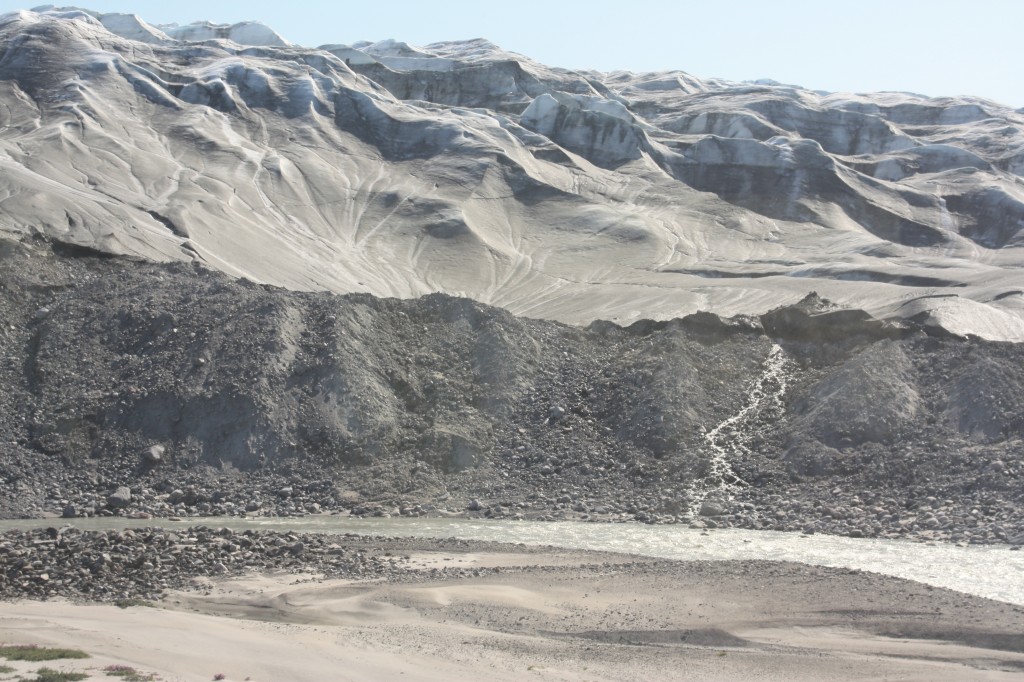
The Greenland ice sheet is melting faster. Scientists also report a decreasing albedo with snow becoming darker. (Pic: I.Quaile)
Fossil fuel power plants are still on the increase – committed carbon emissions are rising fast. At first glance you might respond to that with “so what’s new”? Well, a study is new, which indicates that in spite of all the political rhetoric in a lot of places about switching to renewable energies and moving away from fossil fuels, we are building more fossil fuel power plants than ever before. Unsurprisingly, that is leading to an increase of carbon dioxide emissions, which is bad news for plans to keep global temperature rise below 2°Celsius. It is extremely bad news for those of concerned about the cryosphere and the increasing melt rates of Greenland and parts of Antarctica. The main problem, the authors tell us, is that we have already committed to huge emissions by investing in polluting technologies.
Steven Davis of the University of California, Irvine and Robert Socolow of Princeton University in the US, report in the journal Environmental Research Letters that existing power plants will emit 300 billion tons of additional carbon dioxide into the atmosphere during their lifetimes. In this century alone, emissions from these plants have grown by 4% per year.
The two scientists have already reported on the increasing costs of delay in phasing out fossil fuel sources of energy, notes Tim Radford of the Climate News Network. Thanks again to you people for drawing attention to the study. Their latest research looks at the steady future accumulation of carbon dioxide in the atmosphere from power stations.
“Despite international efforts to reduce CO2 emissions, total remaining commitments in the global power sector have not declined in a single year since 1950 and are in fact growing rapidly,” the report states.
Massive emissions already committed
Governments worldwide have in principle accepted that greenhouse gas emissions should be reduced and average global warming limited to a rise of 2°C.
At the current pace though, scientists have warned that the world is on track for at least 4° Celsius by the end of the century. That could mean drastic rises in sea levels and catastrophic drought in some areas of the world.
“We are flying a plane that is missing a crucial dial on the instrument panel,” said Socolow. The needed dial would report committed emissions. Right now, as far as emissions are concerned, the only dial on our panel tells us about current emissions, not the emissions that capital investment will bring about in future years.”
In the latest study, scientists asked: once a power station is built, how much carbon dioxide will it emit, and for how long? They assumed a functioning lifetime of 40 years for a fossil fuel plant and then tallied the results.
The fossil fuel-burning stations built worldwide in 2012 alone will produce 19 billion tons of carbon dioxide over their lifetimes. The entire world production of the greenhouse gas from all of the world’s working fossil fuel power stations in 2012 was 14 billion tons.
“Far from solving the problem of climate change, we’re investing heavily in technologies that make the problem worse,” the experts stress.
The US and Europe between them account for 20% of committed emissions, but these commitments have been declining in recent years. Facilities in China and India account for 42% and 8% respectively of all committed future emissions, and these are rapidly growing in number. Two-thirds of emissions are from coal-burning stations ad the share from gas-fired stations had risen to 27% by 2012.
Fossil fuel wind-down not fast enough
Davis says more fossil fuel-burning facilities have to be retired than new ones built. “But worldwide we’ve built more coal-burning power plants in the past decade than in any previous decade, and closures of old plants aren’t keeping pace with this expansion”, he added.
According to Socolow, a high-carbon future is being locked in by the world’s capital investments: “current conventions for reporting data and presenting scenarios for future action need to give greater prominence to these investments,” he said.
The current draft of a summary report to the International Panel on Climate Change (IPCC) due to be released in November and viewed by the Times this week, warns of “severe, pervasive and irreversible impacts” unless carbon emissions are brought under control. The IPCC stresses that human-induced climate change will lead to the devastation of homes and property, a scarcity of food and water and human mass migration, as sea levels rise through warming temperatures and – alas – melting ice.
Time for a “new environmentalism”?
What are these cuddly marmots doing on an exhibition stand at Green Week, Europe’s biggest environment policy gathering, being held this week in the Belgian capital Brussels? They have the honour of decorating the stand of the Swiss-based World Resources Forum, not just because they look cute, a representative tells me, but because of their resources-saving, nature-friendly lifestyle. The “marmies” (I have enjoyed their antics many times while hiking in the Swiss Alps) are the hibernating, vegetarian type. They eat enough in the short alpine summer to see them through the winter, which they spend in burrows on the hillside.
Meanwhile, we humans consume the planet’s resources at a disastrously unsustainable rate and pump greenhouse gases into the atmosphere at a rate that is threatening to change the planet beyond recognition, melting polar ice, destroying much of our biodiversity, raising the sea-levels, making the oceans more acid at the same time and devastating many regions with extreme weather, storms, floods and drought.
Hm. Small wonder this year’s Green Week kicked off with a high-level debate on whether we need a “new environmentalism”. James Murray, editor of the London-based online “businessGreen” magazine, who chaired the “summit”, says “environmentalism is in crisis” and green economic models are not becoming mainstream fast enough.
Keynote speaker Jeffrey Sachs, Director of the Earth Institute at Columbia University and environmental guru to many, said fighting climate change certainly had to become priority No.1. In this connection, he picked up on President Obama’s move to break the climate deadlock by capping coal power plant pollution through the EPA. Last time I spoke to him at a meeting in Abu Dhabi last year, he was very frustrated about his country’s stance on emissions and climate. Understandably he is delighted by the new move. We have the technology, says Sachs. These new regulations would force US states to come up with concrete plans to reduce emissions. What we need, he says, is political determination backed up by a firm plan and timetable.
UNEP chief Achim Steiner was also here in Brussels for the gathering. He told me in an interview he didn’t think we need a “new environmentalism”. The environment movement has to keep evolving to meet the challenges of the respective age, he says. And we shouldn’t do down the achievements of environment campaigners to date. He too is upbeat about the Obama administration initiative – and the possibility that China could be prepared to put a cap on its emissions. Nevertheless, even this most optimistic of UN officials has to admit we lack satisfactory answers to many of the sustainability-related challenges of our time.
Marco Lambertini, new DG of WWF International, with whom I conducted an interview when he took office, was addressing the forum for the ngo community. He told me then and repeated here that WWF is changing its campaigning style to reach the masses of people who are not “the converted”. We have to leave our comfort zone, as he puts it. And social media play a key role, he says. He talked about Earth Day and how it has turned from an ngo thing into a local community-driven mass event, thanks especially to the power of social media. He also argues for abandoning what he calls “post-colonial environmentalism”, i.e. money from the north to fund projects in the south, in favour of a more inclusive, local-to-global approach. Only mass pressure from millions can really change the system, Lambertini argues.
Sandra Steingraber, American biologist, author, film-maker and anti-fracking campaigner went furthest in her considerations of the state of the environment movement. Reminding the forum that improvements in the US climate record were thanks to the use of environmentally irresponsible fracking, she says the world is being held hostage by the fossil fuels industry and “we need a vigorous new environment movement to engage in hostage rescue”.
In a week where my attention is shifting between the debates here in Brussels on just what we need to bring about a circular economy and protect strained resources and a stressed environment, and the talks at home in Bonn aimed at a new international climate agreements, it becomes clearer than ever that the issues are completely inter-connected. The increased attention shown by my media colleagues both at DW and amongst the other stations and publications in both the Green Week and the UN talks in Bonn makes me feel optimistic, on the one hand. Environment and climate have come into the mainstream. On the other hand, that demonstrates how seriously they are under threat.
Please see also my DW article on Green Week, the UN climate talks and environmentalism and my interview with Germanwatch political director Christoph Bals on the prospects for those Bonn climate talks.
“We are living in an ice-dependent world” (Iceland’s President)
During my recent visit to Sustainability Week in Abu Dhabi, I was interested to meet the President of Iceland, Ólafur Ragnar Grímsson. He gave one of the keynote speeches at the World Future Energy Summit and was also on the Jury for the prizes presented as part of the Zayed Future Energy Prize to initiatives around the world to promote sustainability through renewable energy in different parts of the world.
I asked him how he had come to be involved so closely with Abu Dhabi, the icy north working with the desert oil state. The link goes back to an Abu Dhabi delegation visiting Iceland 8 years ago to talk about using clean energy. Since then, he finds it fascinating and encouraging to see how the Gulf state is turning itslf into “one of the primary locations in the world for dialogue and cooperation on a clean energy future.”
But the message I’d really like to share with the Ice Blog community is the one about the undeniable connections between what’s happening in the Arctic and what’s happening in the rest of the world. President Grímsson explained his view to me at a reception after the prize-giving ceremony.
We live in an ice-dependent world, says Iceland’s President
In a nutshell, he says one of the key results of scientific research is recent years is that the Arctic plays a major role in influencing weather and other developments around the world, and that fact that the ice is melting fast. Let me quote him:
“I think the melting of the ice is really the frightening message. Climate change is a difficult word, because somehow it is not concrete. The melting of the ice is something that everybody understands.”



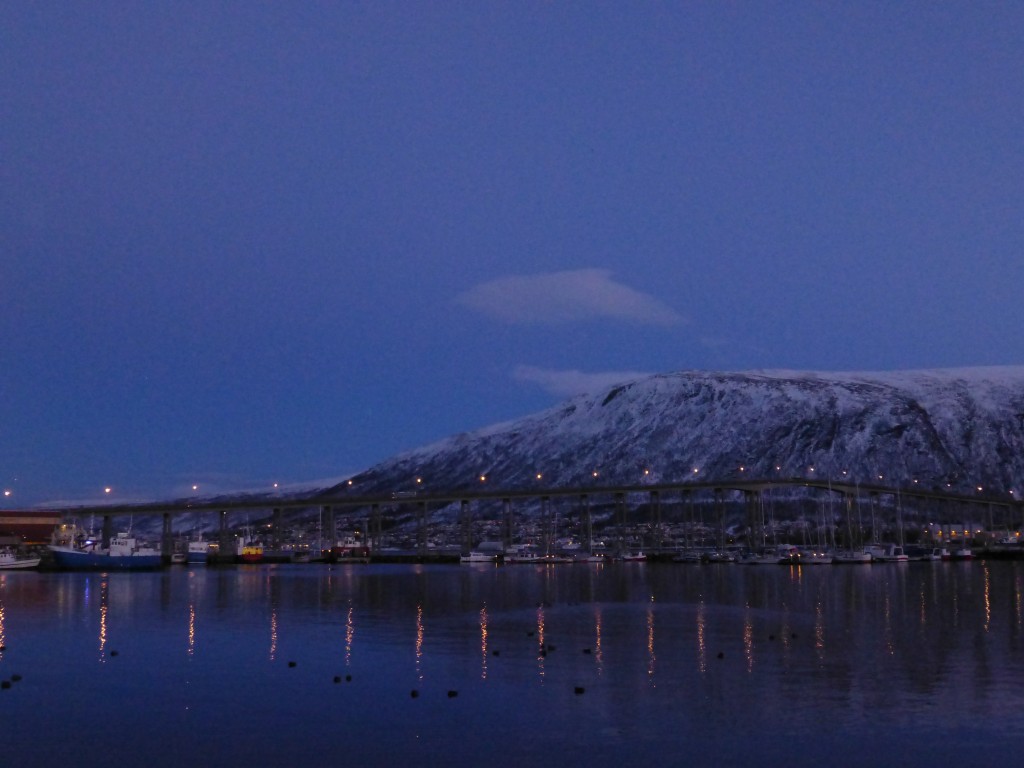
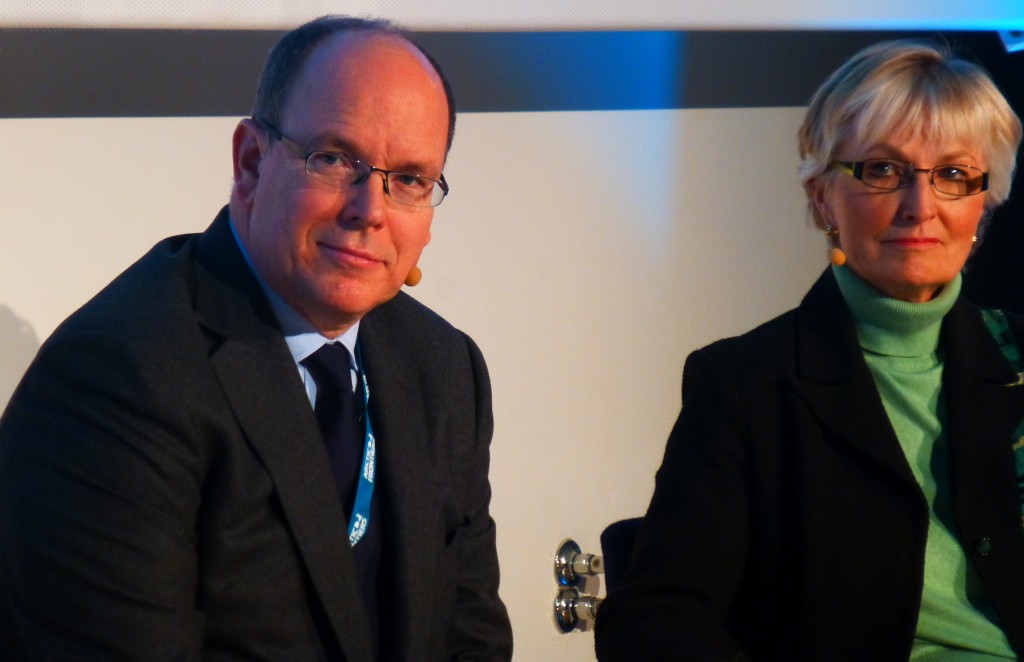
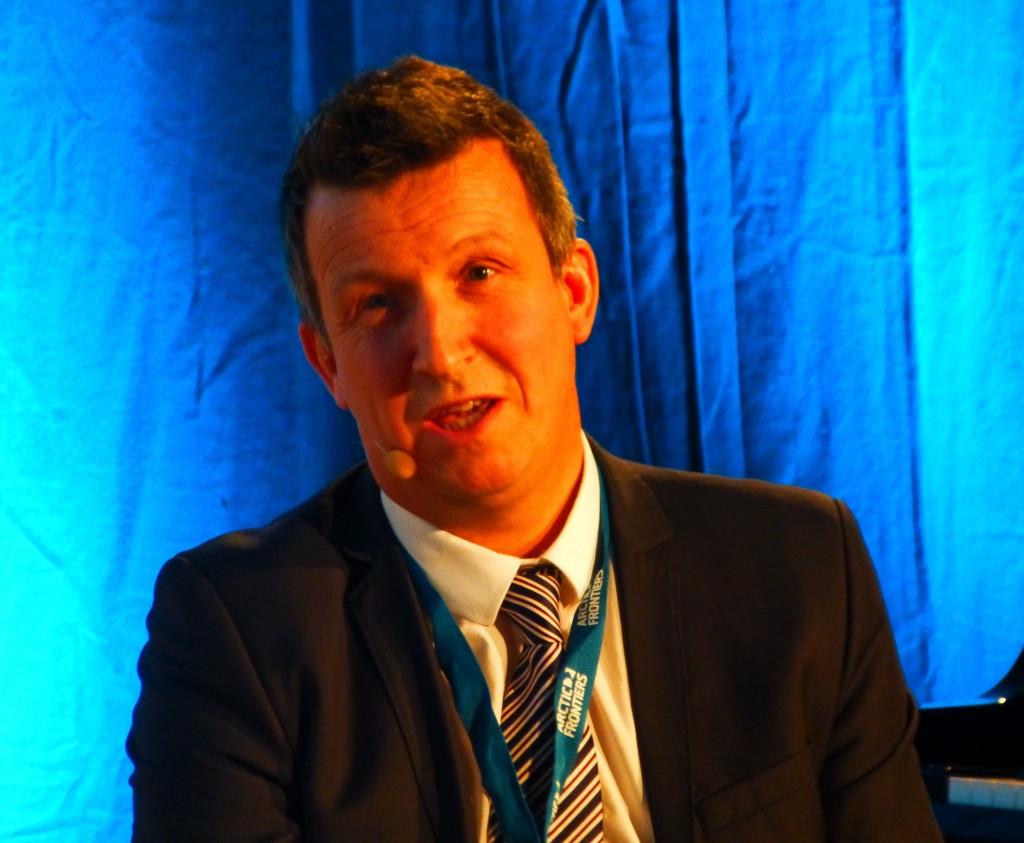


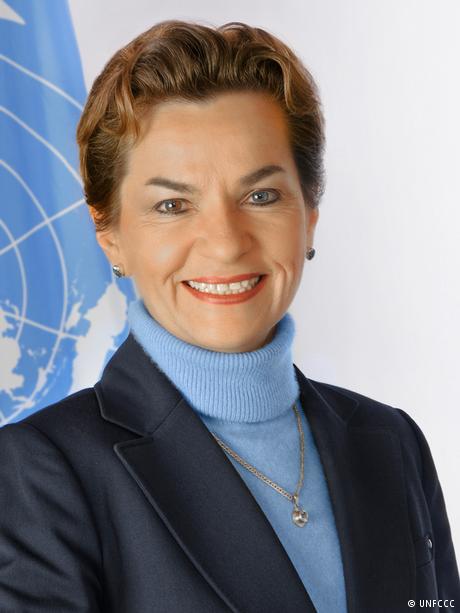
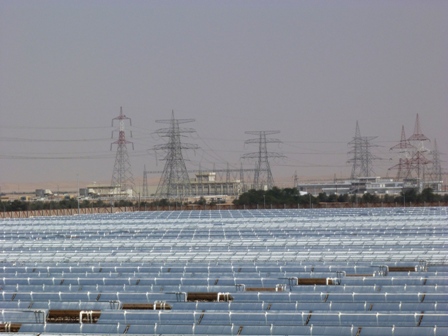



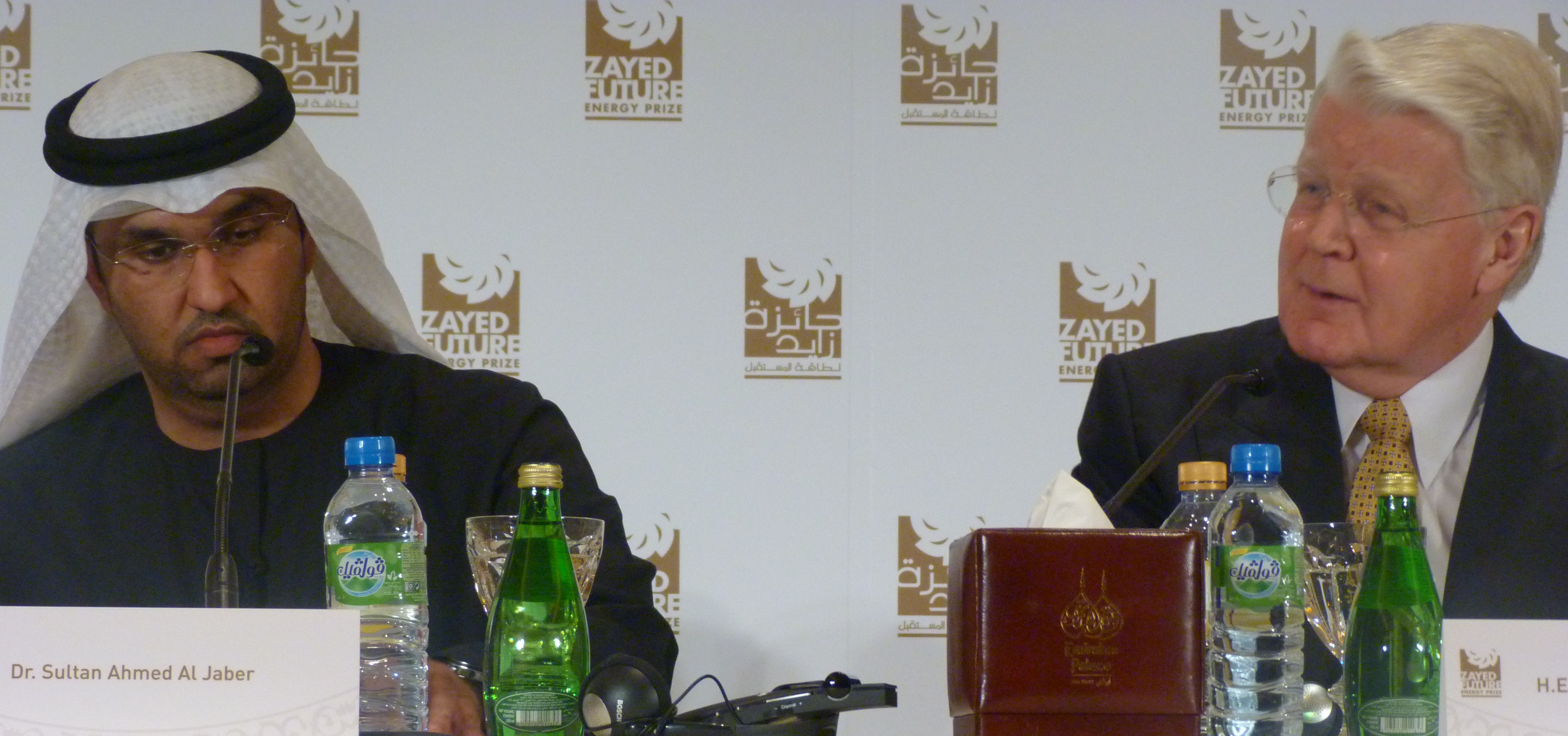
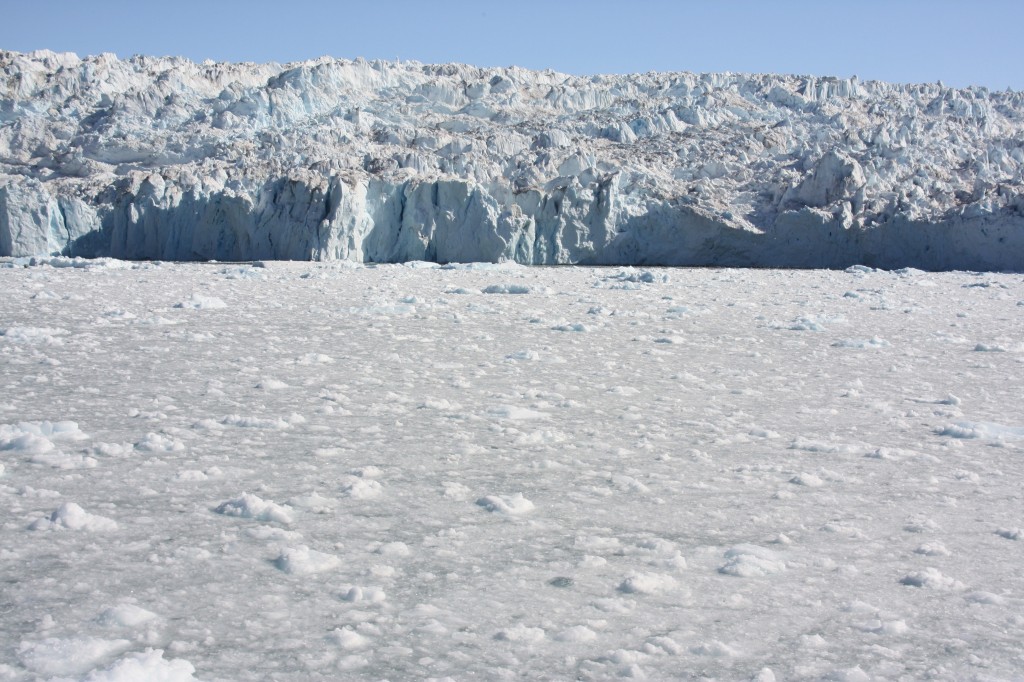
















Feedback